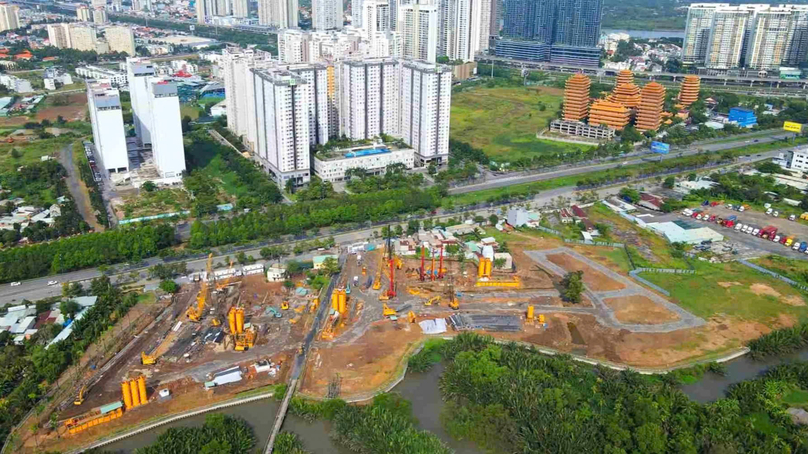By
Vu Pham, Minh Hue
Sun, October 13, 2024 | 9:00 am GMT+7
Many real estate enterprises in Vietnam are recovering after overcoming a critical “life-and-death” phase, says Le Hoang Chau, chairman of the Ho Chi Minh City Real Estate Association (HoREA).

A real estate project in Thu Duc city, Ho Chi Minh City. Photo by The Investor/Vu Pham.
Without going into details about the critical phase, he reiterated Thursday that the real estate market in the south, especially in Ho Chi Minh City, had emerged from a “most difficult” period.
Speaking at a seminar on “Identifying the real estate market at the end of 2024 and the beginning of 2025” in HCMC, he noted that the market has been gradually recovering since the first quarter of 2023.
“At the end of 2023, the market saw a year-on-year decline of 0.8%. However, in the first nine months of this year, it experienced positive growth, reaching around 6-7%, demonstrating a clear recovery,” he said.
Overall, industrial real estate has remained a bright spot, he noted.
Nonetheless, the HoREA leader remained concerned about the health of many real estate enterprises, saying many were still in a weak condition.
Therefore, enterprises should be prudent, carefully consider their investment capabilities, avoid scattered investments, and appropriately allocate financial resources, he advised.
Vo Hong Thang, deputy director of research and development at DKRA Vietnam, said that in the third quarter of 2024, 18,000 “products” were introduced to the real estate market in HCMC and neighboring provinces.
The absorption rate increased significantly in the affordable housing segment, with apartments in the southern economic hub HCMC priced under VND60 million ($2,417) per square meter.
In neighboring provinces like Binh Duong, properties priced around VND30 million per sqm accounted for a large proportion of total transactions.
The secondary apartment market was also vibrant this year, with completed projects seeing transaction prices rise by 5-9% compared to the same period in 2023.
The townhouses, villas and land plots segments also recorded growth, with 6,000 products supplied to the market in Q3, an increase of 18% year-on-year. Transactions were concentrated in HCMC, with prices around VND10 billion ($402,901) per unit, while in adjacent provinces like Dong Nai, Binh Duong, and Long An, prices hovered around VND5 billion.
The passage of related three laws, particularly the 2024 Land Law, significantly boosted transaction volumes in the land plots segment. Over 9,000 land plots were made available the last quarter, up 17% year-on-year.
Thang predicted that land plots would become scarce in the near future, especially those with proper ownership certificates and residential land in already populated urban areas, where absorption rates have increased by over 30%.
Notably, with land price frameworks about to be issued, prices of residential land and those with ownership certificates have surged dramatically.
“Despite increased liquidity, land plot transactions have only reached 30% of the levels seen during the ‘golden period’ of 2019,” he said.
Resort segment yet to stabilize
Meanwhile, the resort real estate segment was still mired in challenges, Thang said.
He noted that the supply of resort villas had decreased by 10-20% compared to last year. He attributed this mainly to the breakdown of profit-sharing commitments between developers and customers, coupled with impacts of the Covid-19 pandemic and related legal disputes.
Therefore, this segment will require more time to stabilize, Thang said.
He expected that with more favorable macroeconomic conditions and attractive loan interest rates (6-6.5% per year), the real estate market would recover well, especially in the apartment and affordable housing segments.
However, to transition to a more positive development cycle, investor sentiment was a key factor. According to the State Bank of Vietnam, a significant increase in bank deposits indicates that a large part of the population was still holding cash, waiting for suitable investment opportunities. Therefore, legal obstacles need to be resolved promptly to increase market supply.
Since August 1, not many projects have been implemented as the market needed more time to absorb the new policies. By the end of 2025, the real estate market in HCMC and surrounding provinces was likely to enter a new development cycle with potential for sustainable and vibrant growth, Thang said.
From: The Investor
Real Estate News










